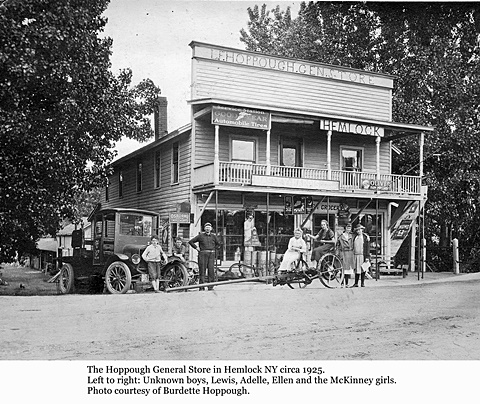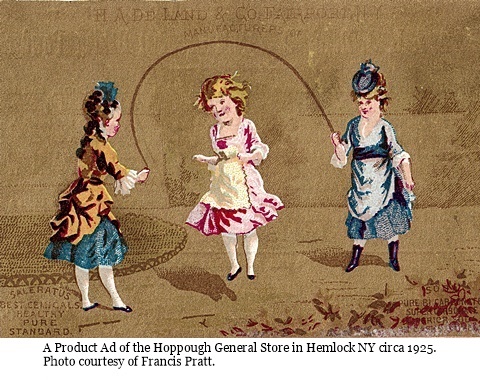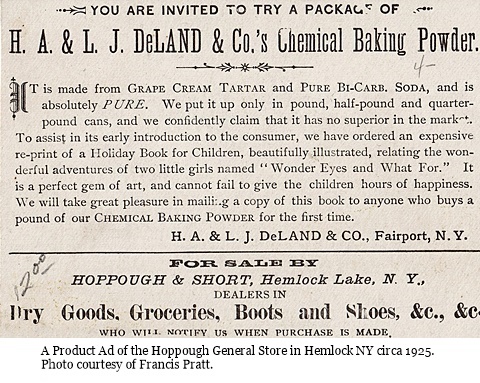
Welcome to Hemlock and Canadice Lakes!
Barns Businesses Cemeteries Churches Clinton & Sullivan Columns Communities Documents Events Time Line Fairs & Festivals Farm & Garden Hiking Homesteads Lake Cottages Lake Scenes Landscapes Library News Articles Old Maps Old Roads & Bridges Organizations People Photo Gallery Podcasts Railroad Reservoir Schools State Forest Veterans Videos
|
Business - The Hoppough General Store in Hemlock NY |
Click any image to enlarge. |
|
1 The Hoppough General Store in Hemlock NY circa 1925. Photo courtesy of Burdette Hoppough.
2 A Product Ad of the Hoppough General Store in Hemlock NY circa 1925. Photo courtesy of Francis Pratt. 3 A Product Ad of the Hoppough General Store in Hemlock NY circa 1925. Photo courtesy of Francis Pratt. The Hoppough General Store in Hemlock NY By the Richmond Town Historian, Joy Lewis. Lewis F. Hoppough (son of Frederick and Leah Coykendall Hoppough of Canadice) was an interesting character. Married in 1883 to Adell Ingraham, he bought a farm at the head of Canadice Lake and settled down to raise a family. The Hoppoughs had five children: Leona, Burdette, Bertha, Marion, and Jessie. In 1917 Lew purchased the old Scanlan Hotel in Hemlock, which he converted to a General Store. By this time all his children were grown and married except 17-year-old Jessie who still lived at home. The store was on the east side of Main Street, just north of the Hemlock Outlet; it was destroyed in a controlled burn in 1970. *Burton Deuel, in his 1983 memoir “Reminiscences” wrote of Lew and his store: “It was like Fibber McGee’s closet. Lew was just as funny as his store.” Burton included a few tales of Mr. Hoppough: You could buy most any farm implement at Lew Hoppough’s store, or groceries, or anything else you could think of. It might not be on display, but it would be somewhere buried under harnesses, or what-have-you. Lewis liked liquor, but didn’t get a chance to get any very often. This [incident] took place during the First World War when we had sugar rationing. He sold sugar, but only one pound per week to a customer. One day a farmer came along and was talking to John Connor outside Lewis’s store. “John,” he said, “I’m going to get one hundred pounds of sugar.” John said, “I’ll bet you won’t get over a pound.” So the farmer went into the store and asked Lew for some sugar. “I can give you a pound,” said Lew, and he weighed out a pound of sugar and handed the sack to the farmer. The farmer took out a pint of whiskey from his pocket and said, “How would you like a little nip?” “Sure would!” Lew replied. He took a good snort and said, “Give me that sack of sugar.” He took it back and did up five pounds and put it on the counter. Then the farmer said, “Better take another sip before I go.” He offered Lew the pint. “Believe I will,” said Lew. “Tastes pretty good.” So he downed another good hooker. Then he reached over the counter, took back the five pounds of sugar and did him up twenty pounds. The farmer said, “Lew, keep the bottle. I’ve got more of the same at home.” Lew said, “Give me that bag of sugar.” He put it back on the shelf, went into the back room, brought out a hundred pound sack, and put it in the farmer’s wagon. The farmer paid for the sugar and drove home just as happy as Lew — but without a headache. [It was around 1925] when I was working the farm with my father-in-law, Wilbur Ashley, we hired a young man who was about six-foot-one-or-two — quite a big fellow. It was wet and muddy that fall so he wore high topped leather shoes. He said he wanted a pair of mud rubbers — heavy ones — to wear over his shoes. So Mr. Ashley took the young man to Lew Hoppough’s Store in Hemlock. When they went in the store, Lew looked up and said, “Hello, Wilbur. What can I do for you?” “I’ve got a young man here that wants a pair of heavy mud rubbers.” “What size?” asked Lew. “Well,” the young man said, “my shoes are size thirteen. I think I would have to have rubbers about a size fourteen.” Well, Lew went over to a cluttered counter and dug out some rubbers from underneath some harness and binder twine — size fourteen, just what the young fellow wanted. If you asked Lew for something out of the ordinary, he’d say, “It’s here somewhere, if I can find it.” There was a tremendous flood in the late twenties. Lew’s store was on the bank of Hemlock Outlet. When it started in to rain [it] wouldn’t let up. The run-off filled the Hemlock Outlet to capacity in a hurry. It rose as high as the underside of the bridge on Main Street in Hemlock. The swollen waters of the creek took out buildings, sheds, swarms of bees, and almost drowned a flock of sheep. Well, the City of Rochester Water Works, who controlled the lake level, sent out their representative to help the people of Hemlock who had suffered damage due to the rising waters of the creek. The man came to town on certain days in order for people to file claims for loss or damage caused by the flood. So, Lew Hoppough filed his claim. The agent asked him what his loss was. “Well, I had my old outhouse down back of the store. It wasn’t worth so much, but I ought to have fifty dollars for it.” “Don’t you think that’s rather a high price for an old outhouse like that?” asked the agent. “Maybe it is,” Lew said, “but as I used to go down to use it, I would set there and would think of some bill that someone owed me and I would take my pencil and write it down on the wall. I don’t know how much the total of those accounts would be, but that flood took my accounts, building and all. So I think I ought to have at least fifty dollars.” “Claim allowed!” said the agent. Lew went home grinning and well satisfied. He’d only presented the bill as a joke.
(Author’s note:) Mr. Deuel’s stories, edited and compiled into one volume, are on display and available to read at the Honeoye-Richmond Historical Society Museum (at the back of the Richmond Town Hall). |


